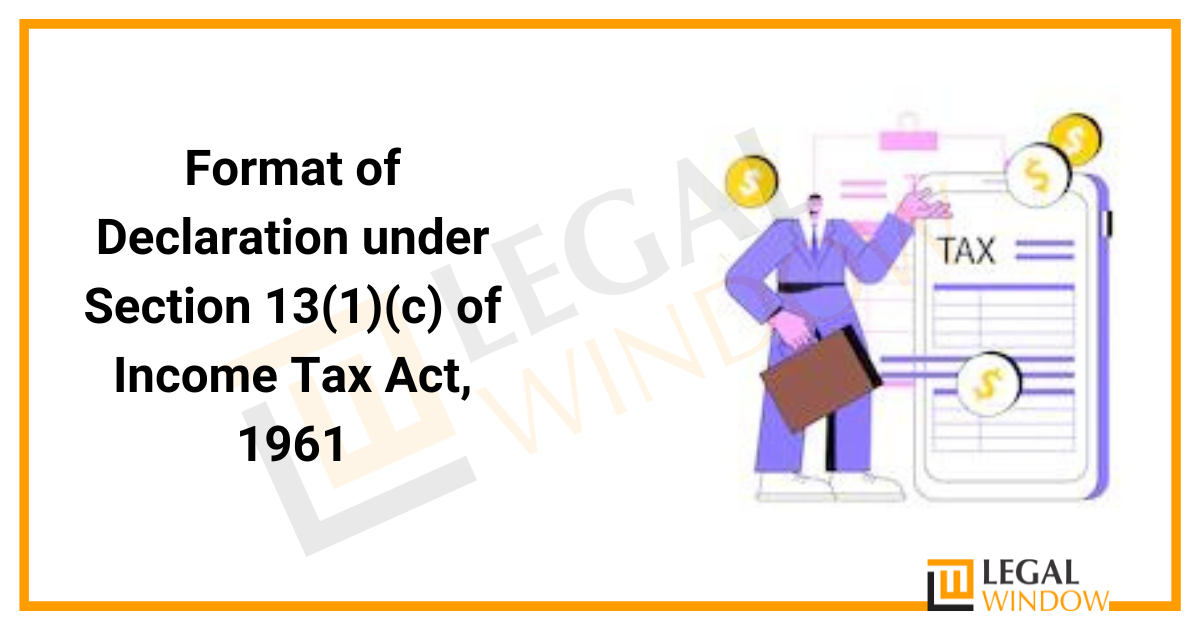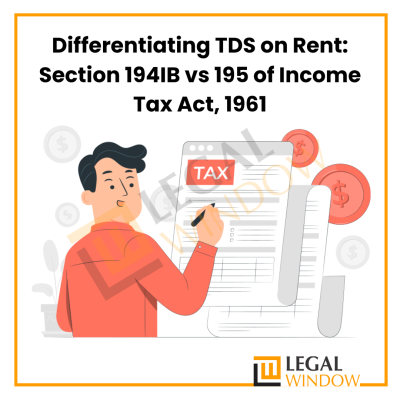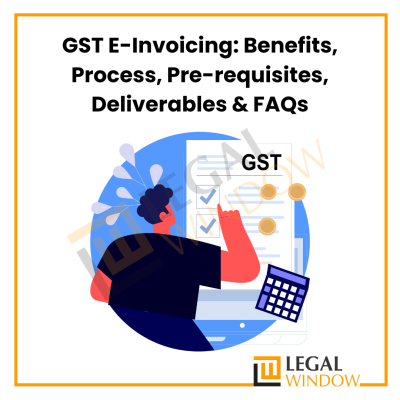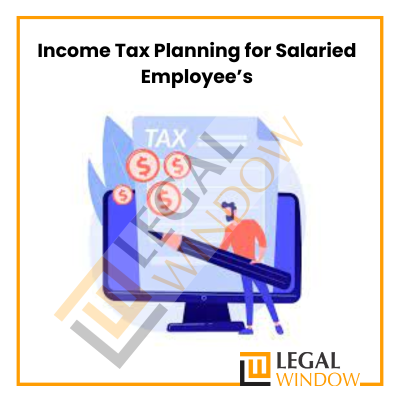Format of Declaration under Section 13(1)(c) of Income Tax Act, 1961
- December 3, 2022
- Income Tax
 Section 13 of the Income Tax Act, 1961 (Income Tax Act) describes the situations in which the exemptions provided by Sections 11 and 12 would not be accessible to a Trust. Section 11 of the Income Tax Act addresses the exemption of income received from trust property or other legal obligations for religious or charitable purposes. Section 12 addresses the exemption of income received by such a trust from voluntary donations that are not made with the express intent that they constitute part of the trust’s or institution’s corpus. The provisions of Section 11 do not apply to a trust established for charitable or religious purposes, as per Section 13(1)(c) of the Income Tax Act, if any portion of the trust’s income or property was used or applied, directly or indirectly, during the previous year for the benefit of any person listed in sub-section (3). In this article, we will discuss Section 13(1)(c) of the Income Tax Act, of 1961.
Section 13 of the Income Tax Act, 1961 (Income Tax Act) describes the situations in which the exemptions provided by Sections 11 and 12 would not be accessible to a Trust. Section 11 of the Income Tax Act addresses the exemption of income received from trust property or other legal obligations for religious or charitable purposes. Section 12 addresses the exemption of income received by such a trust from voluntary donations that are not made with the express intent that they constitute part of the trust’s or institution’s corpus. The provisions of Section 11 do not apply to a trust established for charitable or religious purposes, as per Section 13(1)(c) of the Income Tax Act, if any portion of the trust’s income or property was used or applied, directly or indirectly, during the previous year for the benefit of any person listed in sub-section (3). In this article, we will discuss Section 13(1)(c) of the Income Tax Act, of 1961.
Let us know what is the Format of declaration under Section 13(1)(c) of Tax Act.
| Table of Content |
Section 13(1) (c) of the Income Tax Act, 1961
Any income derived from a charity or religious trust or a charitable or religious institution-
- If such trust or institution was constituted or established after the commencement of this Act, and any portion of such income endures under the provisions of the trust or the regulations governing the institution, or
- If any portion of this income or any property owned by the institution or trust, regardless of when it was founded or created, was used or used in the previous year either directly or indirectly for the benefit of any of the individuals listed in subsection (3): The provisions of sub-clause (ii) shall not apply to any use or application, whether directly or indirectly, of any portion of such income or any property of the trust or institution for the benefit of any person referred to in sub-section (3) in the case of a trust or institution created or established prior to the commencement of this Act, if such use or application is made in accordance with a requirement set forth in the trust or a requirement regulating the institution: The provisions of sub-clause (ii) shall not apply to any use or application, whether directly or indirectly, of any portion of such income or any property of the trust or institution for the benefit of any person referred to in the case of a trust for religious purposes or a religious institution (whenever created or established) or a trust for charitable purposes or a charitable institution created or established prior to the commencement of this Act.
The provisions of Section 11 do not apply to a trust established for charitable or religious purposes, per Section 13(1) (c) of the Income Tax Act, if any portion of the trust’s income or property was used or applied, directly or indirectly, during the previous year for the benefit of any person listed in sub-section (3).
Persons covered under Section 13(1) (c) of the Income Tax Act, 1961
The following are the persons covered under Section 13(1) (c) of the Income Tax Act, 1961:
- The creator of the trust or the institution’s founder
- Any individual who has significantly contributed to the trust or organization (any person whose total contribution up to the end of the relevant previous year exceeds Rs 50,000)
- In cases when the creator, founder, or person in question is a HUF, a family member
- Any trust’s trustee or institution’s management
- Any family member of any of the aforementioned authors, founders, members, trustees, or managers
- Any company in which any of the aforementioned people has a major stake.
Income of Trusts for the Benefit of Interested Persons as per Section 13(1) (c) of the Income Tax Act, 1961
If a religious or charitable trust or institution is founded or established on or after January 1, 1962, and any portion of its income accrues, directly or indirectly, under the terms of the trust for the benefit of any person listed in Section 13(3), then neither Sections 11 nor 12 apply to that trust’s entire income.
If the income or property is used or used during the relevant year for the direct or indirect advantage of the trust’s creator and other individuals listed in section 13(3), the trust’s whole income is likewise ineligible for exemption under sections 11 or 12. The exemption is not lost if the use of the trust income or property complies with a mandatory clause in the trust agreement or a mandatory regulation regulating the institution. This section also applies to trusts and institutions founded or established before April 1, 1962.
Format of Declaration under Section 13(1) (c) of Income Tax Act, 1961
The following is the Format of Declaration under Section 13(1) (c) of Income Tax Act, 1961:
I, ________, the managing trustee of the following trust, “______________,” with its office at XYZ, hereby sincerely assert and declare:-
That I am qualified to make the following declaration and I am aware of the information contained therein.
That no portion of the trust’s income or assets were used in the previous year, either directly or indirectly, to benefit the individuals mentioned in section 13(3) of the Income Tax Act, 1961.
That I am aware of the following people, as listed in Section 13(3) of the Income Tax Act, of 1961:
- Author and Trust’s Founder
- Anyone made a significant contribution (i.e., exceeding Rs 50000)
- Relatives of the author who are HUF
- A trustee or the trust’s manager
- Any relation with any of the aforementioned authors, founders, members, trustees, or managers;
- Any business in which one of the people mentioned in clauses (a), (b), (c), (d), and (e) has a significant stake.
That the trust will not, in the future, directly or indirectly, pay any of the individuals listed in Section 13(3) of the Income Tax Act, 1961 from such income or any of the trust’s assets.
To the best of my knowledge and belief, the aforementioned claim is accurate and truthful.
Trustee
__________
Date:
Place:
 Takeaway
Takeaway
The Memorandum to Finance Act, 2022, which states explicitly that denying the trust the whole exemption because a minor amount of money was used in violation causes problems for the trusts and institutions may also be consulted. Consequently, the author is of the opinion that denying the entire exemption for one violation may be too harsh on the trusts which are run for charitable/religious purposes for AYs prior to AY 2023–24. This is true even though the beneficial amendment to Section 13(1)(c)/(d) is only to go into effect on 1 April 2023.
You can also, connect with our Legal Experts at Legal Window, for further clarification of your Doubts. Our Experts would be Happy to Help!
CA Pulkit Goyal, is a fellow member of the Institute of Chartered Accountants of India (ICAI) having 10 years of experience in the profession of Chartered Accountancy and thorough understanding of the corporate as well as non-corporate entities taxation system. His core area of practice is foreign company taxation which has given him an edge in analytical thinking & executing assignments with a unique perspective. He has worked as a consultant with professionally managed corporates. He has experience of writing in different areas and keep at pace with the latest changes and analyze the different implications of various provisions of the act.
Categories
- Agreement Drafting (23)
- Annual Compliance (11)
- Change in Business (36)
- Company Law (148)
- Compliance (90)
- Digital Banking (3)
- Drug License (3)
- FEMA (17)
- Finance Company (42)
- Foreign Taxation (6)
- FSSAI License/Registration (14)
- GST (120)
- Hallmark Registration (1)
- Income Tax (202)
- Latest News (34)
- Miscellaneous (165)
- NBFC Registration (8)
- NGO (14)
- SEBI Registration (6)
- Section 8 Company (7)
- Start and manage a business (21)
- Startup/ Registration (130)
- Trademark Registration/IPR (40)
Recent Posts
About us
LegalWindow.in is a professional technology driven platform of multidisciplined experts like CA/CS/Lawyers spanning with an aim to provide concrete solution to individuals, start-ups and other business organisation by maximising their growth at an affordable cost.








